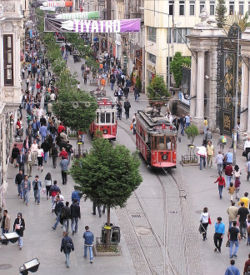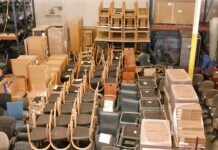 I am concerned. When I turn on my television and see Muslims, I feel scared. I see acts of violence. I hear rants of anger and hate. I see threats and tempers boiling. Muslims do not have a peaceful face on my American TV. They do not appear to be happy people.
I am concerned. When I turn on my television and see Muslims, I feel scared. I see acts of violence. I hear rants of anger and hate. I see threats and tempers boiling. Muslims do not have a peaceful face on my American TV. They do not appear to be happy people.
I do not doubt these images are real. Several parts of the Muslim world are experiencing unimaginable suffering from war, death, poor human rights and fear from social insecurity. What I know, however, is that these images of anger and hate are not universal traits across the Muslim world. I know this because I recently returned from Muslim lands and I experienced quite the opposite…
I travelled through Pakistan, lived in Jordan, and worked in Morocco. In these places, I witnessed the euphoria of simple happiness; a sincere joy of living that I had never before seen in any other part of the world. I laughed alongside new friends from these Muslim countries who took me into their homes and into their lives as if I were a member of their family.
While visiting Lahore, a spectacular city in eastern Pakistan famous for its art, architecture, cuisine, and hospitality, I noticed that a man was following me at a rather fast pace. It was night and I became worried that he might want to do me harm. He began waving at me. I turned onto a busy street and increased my pace. After a good 15 minutes of brisk walking down a well-lit main street, I thought I had lost him. I sat down on a bench for a rest. Within a couple minutes I saw him coming up, walking fast. He appeared out of breath and called out to me to stop.
I jumped up and took off again, hoping to lose him. It didn’t work. Finally I came to a dead end. I was trapped. My only option was to confront this man. When he got closer to me, he said to me in a very polite albeit exhausted voice, “Sir, you dropped your book back there.” He handed me my book, wished me a lovely evening and turned to walk the couple miles back to where our chase had started. I was left standing there in awe, feeling ashamed of my assumptions and amazed at his perseverance and loyalty to a cause.
Some months later on a sunny morning in the Jordan River Valley, the lowest spot on earth, I boarded a local bus on my daily commute to work. A man in traditional Muslim robes began preaching to the bus audience, encouraging them to pray and to attend the mosque. When he noticed me, an obvious Westerner, his attentions suddenly turned and focused on me. I did not comprehend all that he was saying. I felt uncomfortable and decided to get off at the next stop. This preacher’s gaze on me only intensified as his voice grew louder. When the next stop came, I prepared to pay the driver my bus fare. The man who had been preaching got in front of me, paid my fair for me, and said to me in Arabic, “Welcome to Jordan. Our home is your home and I hope you love it here.”
Later that day, I found the bus driver and asked him what that man had been preaching about. The driver said that he was preaching about how taking care of strangers, regardless of their background or religion, was an utmost duty for all Muslims.
In late 2004 I moved to Morocco and rented a small house in the old section of a strikingly picturesque town at the foot of the Atlas Mountains. I was the only American living in this town of 50,000 people. No one, however, treated me as a stranger. Everyone I met invited me into their homes for tea and for jovial lunches of luscious cous-cous. They asked about my family, my country, and how I liked Morocco. Many people asked me how Americans viewed Muslims. They were also concerned with the images they saw on their televisions. I stayed in that town for two years, and during this time I only felt uncomfortable being an American when I watched TV and saw unpleasant images from, and harsh criticisms about, the United States. People, however, never made me feel ashamed for being an American or for not being Muslim.
How contrary these personal experiences are to the images I see on my television. Of course happiness does not often make the evening headlines; death always does. Perhaps it is not the media’s role to provide information about daily life across the world.
What I want is for people in the United States to realise that the Muslim world is vast and varied. In my experience it is also exceptionally welcoming. Since we do not see the everyday life in much of the Muslim world in the media, I encourage us to seek it out. Using the internet, we can easily contact people all over the world — perhaps their televisions give them as negative an image about us as ours does about them. We can also meet people in our communities and discuss images and assumptions we acquire from watching television. By reaching out in this way, we will gain a personal and more balanced image.
Those of us with positive cross-cultural experiences should be vocal in counteracting stereotypes and assumptions. We can do this by simply sharing our experiences. Though I do not reach audiences as wide as those reached by CNN and Fox News, I feel blessed to be able to spread positive news from the Muslim world to anyone who will listen.
Lee Wilbur is an intercultural relations consultant.
This abridged article is distributed by Common Ground News Service
Full article: Arab Washingtonian, 1 February 2007, reprinted with permission



















